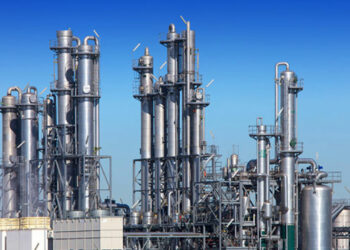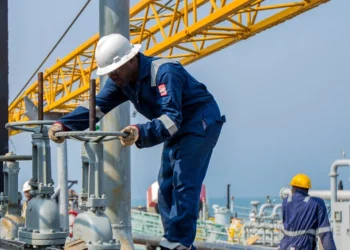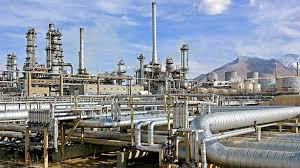In the last quarter of the year the oil and gas witnessed an increase in oil production and significant strides such as the commencement of petrol production at the Dangote Refinery.
This move is expected to reduce Nigeria’s reliance on imported fuel and strengthen domestic supply chains. Additionally, natural gas exports continue to expand, particularly with new partnerships in Asian markets thus increasing the possibility of more affordable electricity at a closer timeline.
Overall, the 2024 saw strategic developments across the energy sector, from oil and gas production to renewable energy investments and power infrastructure improvements.
While challenges remain, these advancements are critical for achieving energy security and supporting Nigeria’s economic growth.
The year started with the Nigerian Upstream Petroleum Regulatory Commission (NUPRC) calling on new investors to register for the 2024 oil block licensing bid round.
Positive government stance and investor optimism set the stage for increased investments in the oil sector and government set the path to address challenges in oil production, including theft and vandalism, which required sustained and focused efforts for long-term solutions.
Initiatives like pipeline replacement and rig sharing was initiated with the aim to enhance efficiency and drive down production costs in the industry.
The Nigerian oil sector geared up for significant developments into the second half of 2024.
The Commission maintained that the the 2024 oil block licensing bid round signals a renewed interest in attracting investments to the sector.
On the other hand, the Nigerian National Petroleum Company Limited (NNPCL) during the period in review declared a state of emergency on oil production, indicating a shift towards addressing longstanding challenges in the industry. The positive stance of the government towards new investments, indicating a more favorable environment for potential investors government’s eagerness to attract investments and the promising signals within the oil industry could drive an increase in investor participation.
This optimism sets the stage for a potentially transformative period in Nigeria’s oil sector.
Government also initiated security issues of oil theft, pipeline vandalism, and illegal refineries in the Niger Delta region.
Experts however, expressed a belief that a renewed and more focused approach could yield better results this time as they emphasized the importance of consistent and persistent actions, underscoring the need for sustained efforts to ensure long-term success in combating these challenges. Furthermore, experts at different fora discussed the NNPC’s plans to replace aging pipelines that have been in operation for over four decades and also touched upon the concept of rig sharing, a program proposed by the NNPC to enhance production efficiencies by sharing drilling rigs among oil companies. This initiative aims to optimise resources and streamline operations, ultimately driving down production costs and improving overall efficiency in the sector. Looking ahead to the second half of 2024, stakeholders outlined key expectations, including the anticipation of increased investments in the upstream sector.
With improved terms and capped signature bonuses in the new licensing round, Nigeria was poised to attract a fresh wave of investments.
They emphasised the importance of ensuring that winning bidders promptly commence operations to kickstart growth in oil production.
With a concerted effort to address challenges, implement innovative solutions, and attract investments, Nigeria’s oil sector is primed for growth and transformation in the second half of 2024.
The status of the Nigerian oil and gas industry as the dominant contributor to Nigeria’s external reserves undoubtedly serves as a pointer to the economic importance of the sector to the nation.
Thus, the fixing the Nigerian oil and gas industry has a significant positive impact on the ongoing macro-economic challenges that the nation is facing. The overarching importance of the Nigerian oil and gas sector to the overall wellbeing of the Nigerian economy may explain the continuous efforts by the government to improve the investment and operational climate in the said sector, with the aim of attracting home-grown and international investors.
Indeed, in furtherance of governments continuing drive to boost the attractiveness of the oil and gas sector, President Bola Ahmed Tinubu, on February 28, 2024, signed one executive order and two directives (the “Executive Orders”) aimed at introducing positive reforms to the oil and gas sector.
These Executive Orders put in place, fiscal incentives for certain types of non-associated gas projects, reduce contracting costs and timelines in the sector, as well as obliterate any leakages impacting the compliance with local content requirements within the Nigerian oil and gas sector.
These Oil and Gas Companies (Tax Incentives, Exemption, Remission, etc.) Order 2024 (“Tax Incentive Order”)
Wholistically, qualifying non-associated gas (“NAG”) projects now enjoy incentives pursuant to the Tax Incentive Order, and these incentives as currently established, will ultimately engender a more investor-friendly fiscal regime in the Nigerian oil and gas sector.
The NAG greenfield developments in onshore and shallow water locations, that have a first commercial production date that occurred on or before January 1, 2029, shall, where the hydrocarbon liquids (“HCL”) content, does not exceed 30 barrels per million standard cubic feet, MMSCF, enjoy a gas tax credit at the rate of US$1.00 per thousand cubic feet, MCF or 30 per cent of the fiscal gas price1, whichever is lower; and exceeds 30 barrels per MMSCF, but is lower than 100 barrels per MMSCF, enjoy a gas tax credit at a rate of US$0.50 per thousand cubic feet, or 30 per cent of the fiscal gas price, whichever is lower.
Also, any greenfield NAG project with first commercial production after 1st of January, 2029 shall be eligible for gas tax allowance, at a rate of US $0.50 per MCF or 30 per year of the fiscal gas price, whichever is lower, provided the HCL does not exceed 100 barrels per MMSCF.
The the HCL content of the NAG Projects will be as determined in line with a Guideline that will be issued by the NUPRC and the tax credit granted under the Tax Incentive Order is expected to apply for a maximum period of ten years, after which it shall become a tax allowance, claimable in accordance with the provisions of the Tax Incentive Order.
Instructively, any tax credit accruing to greenfield NAG projects in any year shall not exceed the income tax payable by the company for that year, and shall not be combined with any incentives for the same greenfield NAG projects applicable under the Associated Gas Framework Agreement.
Additionally, the Tax Incentive Order provides that gas companies undertaking new and ongoing projects in the midstream oil and gas industry, which is subsisting as at the date of the Tax Incentive Order, shall be granted a gas utilisation investment allowance on qualifying expenditure on plant and equipment incurred by the company, which shall be utilised to reduce the company’s assessable profits in the qualifying year.
The rate of the gas utilisation investment allowance shall be 25 per cent of the actual expenditure incurred on such plant and equipment purchased.
The gas utilisation investment allowance shall not prejudice the applicability of any other allowable deductions, allowances, and incentives applicable to the company under the Companies Income Tax Act or any other applicable legislation.
The Tax Incentive Order mandates the minister of finance to introduce fiscal incentives to ensure that investments for deep water oil and gas projects achieve a competitive internal rate of return.
However, in the interim, and pending the minister’s compliance with the Tax Incentive Order, the Ministry of Finance Incorporated and the Ministry of Petroleum Incorporated, being shareholders of the NNPCL, are mandated to take steps to ensure that NNPCL considers and implements commercial enablers for new brownfield and greenfield investments in the deep water.
Also, the president issued the Local Content Directive in order to prevail on the Nigerian Content Monitoring and Development Board (NCDMB), to ensure that its implementation of the Local Content Act by considering the practical challenges of insufficient in-country capacity for certain services and does not hinder investments or competitiveness in the oil and gas projects in Nigeria.
Specifically, the Local Content Directive seeks to plug leakages in the industry, as it expressly empowers the NCDMB to reject a Nigerian Content Plan (NCP) that has an intermediary entity that lacks the essential capacity to perform the services stated in the NCP. Additionally, any NCP approved by the NCDMB must show genuine and demonstrable capacity of the company to execute the relevant project or activity within Nigeria.
The Local Content Directive empowers the NCDMB to develop guidelines for accessing and verifying the capacity of companies seeking contracts for specific activities under the Local Content Act.
Alao issued during the period so Presidential Directive on Reduction of Petroleum Sector Contracting Costs and Timelines, 2024 (Contracts Directive)
Over the years, the contracting process in the Nigerian oil and industry has been overly protracted due to the bureaucracy involved in obtaining requisite approvals for such contracts. Consequently, the contracting cycle was typically delayed, and this impaired the ability of the operators and service providers to speedily conclude the requisite projects, which in turn, negatively impacted the economic projections of the FGN, as well as the return on investment of other investors.
Tinubu, issued the Contracts Directive, with the aim of reducing contracting costs and timelines within the sector, by shortening the procedure for getting approval for contracts, in line with global best practice.
Specifically, the Contracts Directive seeks to simplify and compress the contracting cycle to a period of not more than six (6) months, increase the duration for third party contracts, as well as raise the contract approval thresholds to accommodate the prevailing rate of inflation.
Instructively, the Contracts Directive states that NNPCL’s consent for the award of contracts and procurement of same under Production Sharing Contracts (PSC) or Joint Operating Agreements (JOA), shall only be triggered in relation to a minimum financial threshold of Ten Million United States Dollars ($10,000,000.00), or the Naira equivalent determined at the NAFEX FMDQ exchange rate, or any other platform determined by the Central Bank of Nigeria. Also, the Ministry of Finance Incorporated and the Ministry of Petroleum Incorporated are mandated to take steps to procure that NNPCL amends the JOAs or PSCs to alter the procurement threshold and ensure that the threshold is reviewed and adjusted annually, in accordance with the rate of consumer inflation disclosed by the National Bureau of Statistics.
The NNPCL, NNPC Upstream Investment Management Services (NUIMS) and NCMDB are also mandatorily required to collaborate with industry stakeholders to simplify the contract approval process and adopt a single-level approval by NUIMS and NCDMB at each contract stage, including the prequalification, technical, commercial, and final approval stages.
Additionally, the consent and approval timelines required pursuant to the terms of PSCs or JOAs, including the communication of the decision by NNPCL and NUIMS in this regard to an applicant, shall be within fifteen days from the date of submission of the relevant application.
The failure of NNPCL or NUIMS to communicate the sufficiency or otherwise of an applicant’s application within the timeframe provided will result in a deemed approval of such application.
The NCDMB is also required to review any NCP and communicate its decision within ten days, as stipulated under the Local Content Act.
In the absence of any communication from NCDMB, the NCP will be deemed to have been approved upon the expiration of the stipulated timeline.
Similarly, for all other applications to the NCDMB that do not have stipulated timelines, NCDMB is required to respond within fifteen days of NCDMB’s receipt of the request, otherwise such request would be deemed to have been approved.
The Contracts Directive provides that the duration of third-party contracts awarded pursuant to a PSC or JOA should be increased from three years to five years, with the option of renewal for an additional two years, after the expiration of the initial five year term.
It is widely believed that the Executive Orders are a good development in the Nigerian oil and gas sector, as the directives contained therein will facilitate efficiency in the contracting processes, plug leakages in the local content regime whilst signaling to investors in the gas sector, particularly those seeking to exploit non-associated gas resources, that their investments will ultimately thrive and not be eroded.
On the balance, these Executive Orders are a breath of fresh air to the Nigerian oil and gas industry, and the President should be commended for this intervention.
It is also expected that going forward there are reasonable expectation that the multiplier effect of these Executive Orders will be to unlock investment and stimulate efficiency in the Nigerian oil and gas industry, which will ultimately increase investor footprint and more viable projects in the oil and gas sector. However, as with many regulatory interventions in Nigeria, the success of the Executive Orders will be dependent on the implementation of same, especially with regards to amending subsisting laws and contracts to give effect to the Executive Orders
The sector’s market capitalization grew by 37.41 per cent by the end of Q1 2024, reaching N2.4 trillion.
The 2024 licensing round had put on offer 12 new blocks across different geological terrains, including onshore basins, continental shelves, and deep offshore territories.
Shell Nigeria Exploration & Production Company plans to finalize FID for the $5.5 billion Bonga North deepwater project in 2024.
As of the start of 2024, Nigeria’s gas reserves stood at 209.26 trillion cubic feet.
Nigeria’s crude oil and condensate reserves totaled 37.5 billion barrels as of the start of 2024.














